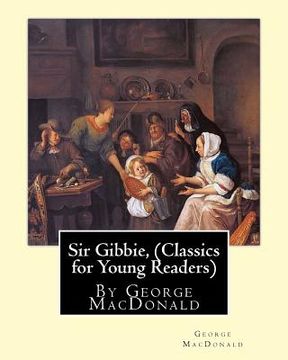Sir Gibbie, By George MacDonald (Classics for Young Readers) A NOVEL (in English)
Synopsis "Sir Gibbie, By George MacDonald (Classics for Young Readers) A NOVEL (in English)"
Follow Sir Gibbie on his adventures through the moors of Scotland's Highlands more than a century ago. Having no mother and an alcoholic father, Gibbie must survive on the streets as a child unable to read or speak. See how this boy wins the hearts of his neighbors and offers what little he has to help others. Sir Gibbie teaches adults and children alike about the ability to sacrifice self, and to strive for a world more honest and pure than our own.(Classics for Young Readers) Sir Gibbie is an 1879 novel by the Scottish author George MacDonald. It is notable for its Doric dialogue, but has been criticised, especially by members of the Scottish Renaissance, for being part of the kailyard movement. Despite this there are far more who claim the book paints a fair view of urban as well as rural life. The book doesn't seem to dwell as long on physical geography as it does on the spiritual geography of the soul. MacDonald's editor, Elizabeth Yates wrote of Sir Gibbie, "It moved me the way books did when, as a child, the great gates of literature began to open and first encounters with noble thoughts and utterances were unspeakably thrilling." The book shows a complex cast of characters from all the social levels: from the laird to the homeless, going through a couple of priests, one of them prone to yield to worldly considerations, although he's good enough, or clever enough, not to fall into wickedness; the other merely pompous and self-righteous. The aim of the story is to show that the idea that bad people are the almost inevitable result of unjust social treatment is wrong.Wee Sir Gibbie has all the numbers to become one of the dregs of society: a drunkard father; as a child he gets in a den of assassins; in rags and poverty, he flies away; then he is punished for having done good to others. But he grows to become a Christ-figure, a knight-errant, a wrong-righter. In 1937, the novel was included in an influential list of notable English language literature entitled Literary Taste: How to Form It (second edition). George MacDonald (10 December 1824 - 18 September 1905) was a Scottish author, poet, and Christian minister. He was a pioneering figure in the field of fantasy literature and the mentor of fellow writer Lewis Carroll. His writings have been cited as a major literary influence by many notable authors including W. H. Auden, C. S. Lewis, J. R. R. Tolkien, Walter de la Mare, E. Nesbit and Madeleine L'Engle. C. S. Lewis wrote that he regarded MacDonald as his "master": "Picking up a copy of Phantastes one day at a train-station bookstall, I began to read. A few hours later," said Lewis, "I knew that I had crossed a great frontier." G. K. Chesterton cited The Princess and the Goblin as a book that had "made a difference to my whole existence". Elizabeth Yates wrote of Sir Gibbie, "It moved me the way books did when, as a child, the great gates of literature began to open and first encounters with noble thoughts and utterances were unspeakably thrilling."Even Mark Twain, who initially disliked MacDonald, became friends with him, and there is some evidence that Twain was influenced by MacDonald.Christian author Oswald Chambers (1874-1917) wrote in Christian Disciplines, vol. 1, (pub. 1934) that "it is a striking indication of the trend and shallowness of the modern reading public that George MacDonald's books have been so neglected". In addition to his fairy tales, MacDonald wrote several works on Christian apologetics including several that defended his view of Christian Universalism.George MacDonald was born on 10 December 1824 at Huntly, Aberdeenshire, Scotland. His father, a farmer, was one of the MacDonalds of Glen Coe, and a direct descendant of one of the families that suffered in the massacre of 1692.The Doric dialect of the Aberdeenshire area appears in the dialogue of some of his non-fantasy novels.MacDonald grew up in the Congregational Church, with an atmosphere of Calvinism..........

